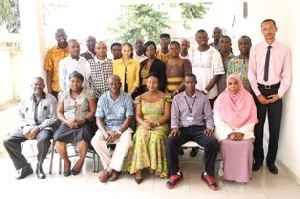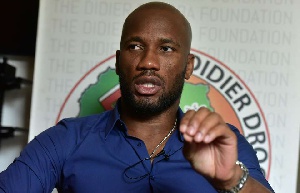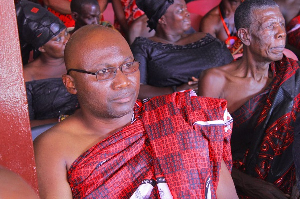- Home - News
- TWI News | TV
- Polls
- Year In Review
- News Archive
- Crime & Punishment
- Politics
- Regional
- Editorial
- Health
- Ghanaians Abroad
- Tabloid
- Africa
- Religion
- Election 2020
- Coronavirus
- News Videos | TV
- Photo Archives
- News Headlines
- Press Release
Press Releases of Saturday, 22 September 2012
Source: Communications and Information-WACSI
WACSI educates diplomats and government officials from Africa on the role of civil society
The West Africa Civil Society Institute (WACSI) welcomed 22 diplomats, state and non-state actors from African countries who are taking part in a Peace and Security Course organized by the German Development Agency (GIZ) and the Kofi Annan International Peacekeeping Training Centre (KAIPTC) in Accra Ghana.
This encounter enabled WACSI to contribute to the KAIPTC/GIZ Development Diplomacy for Peace and Security Programme. During the study visit that was facilitated by Charles Vandyck, Capacity Building Officer of WACSI and Nana Afadzinu, Executive Director of WACSI, participants had an opportunity to reflect and discuss on the Role of Civil Society in Africa.
Participants were exposed to contemporary thinking on civil society. They explained that civil society is composed of institutions that represent citizens, promote freedom of expression or a group of people advocating for citizen’s rights. They sought to understand best approaches that could foster collaboration between the state and civil society on the continent. The facilitators explained that civil society is a complex concept. They pointed out that it is a complex sphere that works within the business, state and private sectors and it interacts closely with all sectors in society.
The platform enabled participants from Ghana, Tanzania, Nigeria, Rwanda, Cameroon, Burundi, Togo, Mali, Sudan, Cote d’Ivoire, Sierra Leone, The Gambia and Ethiopia to have a broader and enhanced understanding of civil society, its role and challenges. This enabled them to be clear on how their respective institutions can collaborate with civil society to foster good governance and democracy in the continent.
Col. E. A. Adjei of KAIPTC emphasized on the Centre’s confidence in WACSI to provide participants with valuable information on the state, role and challenges of civil society. This is to enable the participants to better understand how they can inform collaboration processes between state and non-state actors in their countries. Col. Adjei was satisfied with the delivery approach, the content of the discussions which focused on civil society and governance issues.
The programme which is in its fifth year has benefitted from the expertise of WACSI to provide participants with substantial information on the tactical spaces of collaboration between state and non-state actors.











